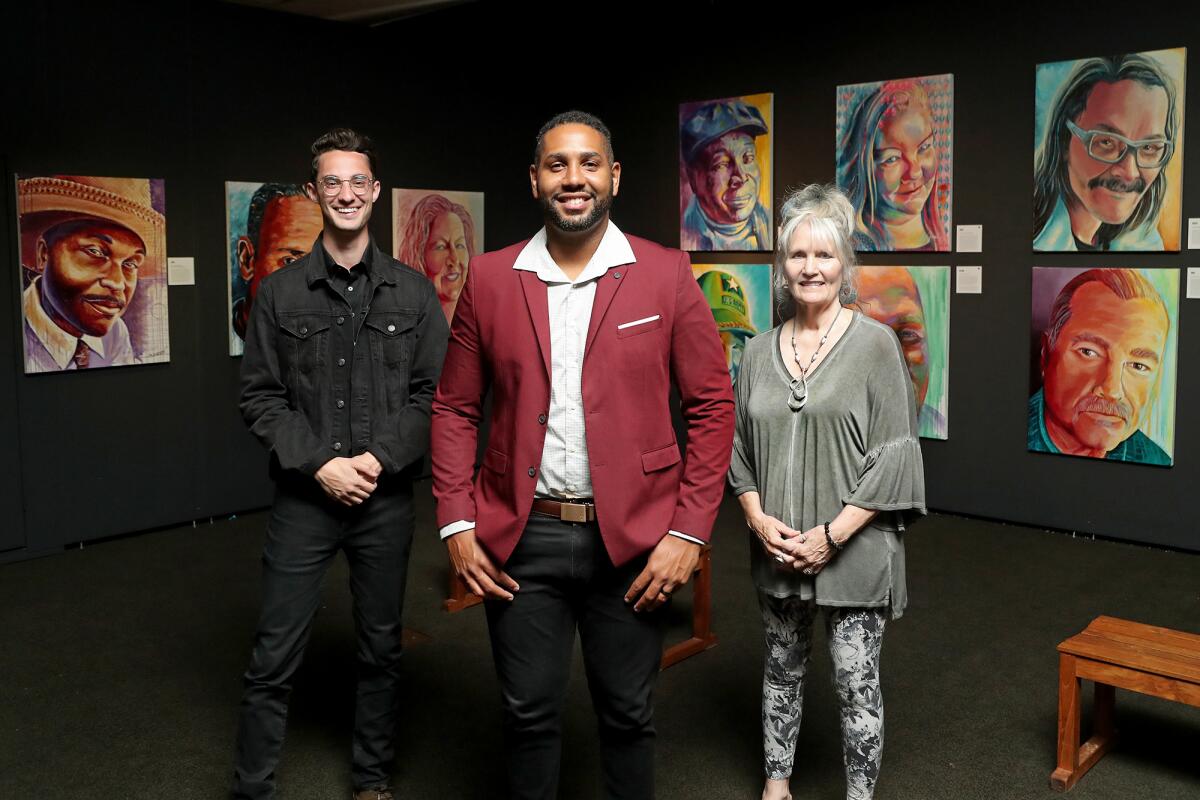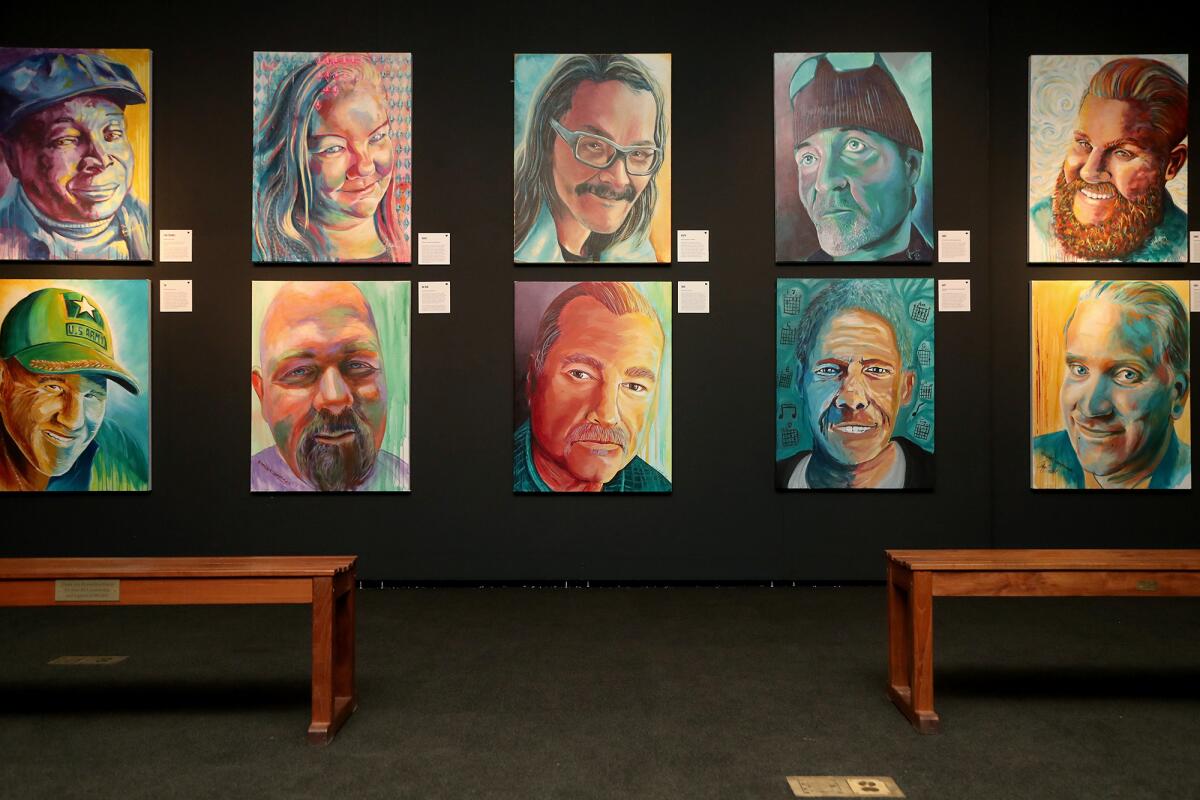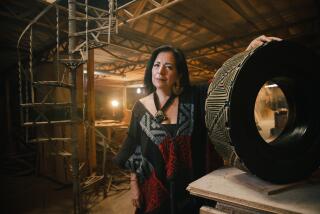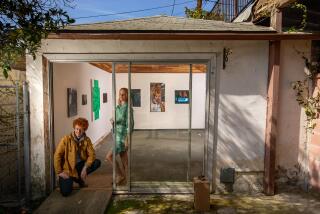‘I try to show people who they are’: O.C. exhibit features portraits of homeless people

- Share via
Artist Damin Lujan had never painted with acrylics or oils until he took a class in partnership with nonprofit Faces of Mankind and an Anaheim emergency shelter.
“I was a little afraid of this class. But when I got to sit next to Victoria and hear her story over dinner, I couldn’t wait to pray and paint her,” Lujan wrote in the art gallery’s label.
For the record:
11:59 a.m. June 22, 2021An earlier version of this article did not clarify that former Muzeo staff Della Rose initially reached out to Brian Peterson for the “Faces of Mankind: Portraiture for Social Change” exhibit.
His portrait of Victoria, whom he met through Bridges at Kraemer Place, shows her looking directly at the viewer with an arched brow and a smile. Her face is painted in pink and purple undertones. She’s adorned with gold flowers on a collage background of Bible pages.
Hers is one of 35 paintings on view at Muzeo Museum and Cultural Center’s “Faces of Mankind: Portraiture for Social Change” show. In addition to Anaheim, the gallery includes portraits of unhoused and formerly unhoused residents from Santa Ana, Riverside and Detroit.
An Orange County nonprofit recently broke ground on a project to transform a motel into a permanent supportive housing facility, with about half of the units set aside for the mentally ill.
Brian Peterson was working as a car designer for Kia Motors in Irvine when he founded the Faces of Mankind project in 2015 as a response to the homelessness in the Santa Ana neighborhood he moved into with his wife.
Typically, he befriends homeless people and asks if they want to be part of the project. He takes a couple of candid photos while asking them about their lives — happiest moments, family, dreams. Then, he prints the photo in black and white and begins to paint. Once he’s finished, he reveals the portrait to his subjects and asks them to sign it.
When the artwork is sold, 50% of the proceeds go into what Peterson calls a “love account.” The subjects of the paintings decide how to use the money. Some have purchased clothing, a van, train tickets, wheelchairs, army cots or rented hotel rooms. The majority choose to purchase bicycles. Artists receive 40% of the proceeds and 10% goes back toward the nonprofit.
Some paintings in the Muzeo show, like Lujan’s portrait of Victoria, identified only by her first name, are available for sale from about $2,000 to $7,000 through the Faces of Mankind website.

)
“I try to show people who they are,” Peterson said. “People may forget those living on our streets or see them as living in guilt, shame, failure and all the things that we try to avoid. I’m saying, what if I can show who you actually are in a painting full of color and life?”
Peterson emphasizes the friendship portion of the project as essential to treating people with dignity.
“There’s always the risk, when you’re either photographing someone or painting someone, of exposing people to the world in unhealthy ways,” Peterson said. “Dignity for me starts with friendship. It puts us both at a level where I’m not above you. I’m just trying to be human, and I hope that it translates into the paintings.”
His relationships with his subjects don’t always last. Although he spent much time with Matthew, the subject of his first portrait, they’re no longer speaking.
At one point, Peterson helped Matthew get lined up for free permanent housing.
“When we had to sign some paperwork to the house, I thought it was the greatest victory in my entire life,” Peterson said. “The minute Matt heard the word ‘paperwork,’ he began to feel like it was a trick … and so he now believes that I’m trying to hurt him.”
Peterson later added he doesn’t think their story is over and is open to connecting again.
The purpose of Faces of Mankind is to connect with people and share their stories through art but not necessarily to solve homelessness.
A San Clemente couple’s visit to Doheny State Beach to feed homeless people ended with the husband in handcuffs and his wife calling 911 on the ranger who arrested him.
When co-curators Kelly Chidester and Katie Adams Farrell approached Peterson, they were looking for work to fill half of Muzeo’s main gallery space in conjunction with the traveling National Endowment for the Arts exhibit “For All the World to See: Visual Culture and the Struggle for Civil Rights.” The show is a collection of photographs, TV clips, art posters and historic artifacts that trace how images and media transformed the modern civil rights movement.
Farrell said the through line between the side-by-side shows is how visual culture influences people, particularly how it can help us to see one another with more humanness.
“Imagery and visuals are really big with both of those exhibitions,” Chidester said. “What do we want our visitors to walk away with? We kept coming back to this idea of humanity and equality. Even though both of those exhibitions touch on different struggles, the main theme of the visuals is how that informs our perceptions of each other and our communities.”
Since transforming the project into a nonprofit, Peterson’s role has changed. He quit his car-designing job in 2019 to become a pastor at Vineyard Anaheim. About nine months into the pandemic, he decided to quit his job as a pastor to become a full-time artist.
“In the midst of the pandemic, I went to zero income and started to pursue art,” he said. “It’s not like I hadn’t done any art. I realized I needed to get back to the guy who’s an artist and loves to create with his community … and my job was hindering that progress.”
Peterson sees his art as a form of worship and wants to take on the responsibility of helping others do the same in their respective cities. In addition to helping artists Scott Schaible in Detroit and Marybeth Stafford in Riverside develop their projects, he’s received messages from others in Bakersfield, Tennessee and as far away as Africa seeking the same. He hopes the project can spread on a global scale through coffee table books or full-length documentaries.
For now, he’s growing the nonprofit and out in the streets, painting a portrait once a month.
If you go
What: “Faces of Mankind: Portraiture for Social Change”
When: Wednesday-Sunday, 11 a.m. to 5 p.m., through Aug. 11
Where: Muzeo Museum and Cultural Center, 241 S. Anaheim Blvd., Anaheim
Cost: General admission $10
Info: muzeo.org
Castaneda writes for Times Community News.
More to Read
Sign up for Essential California
The most important California stories and recommendations in your inbox every morning.
You may occasionally receive promotional content from the Los Angeles Times.











